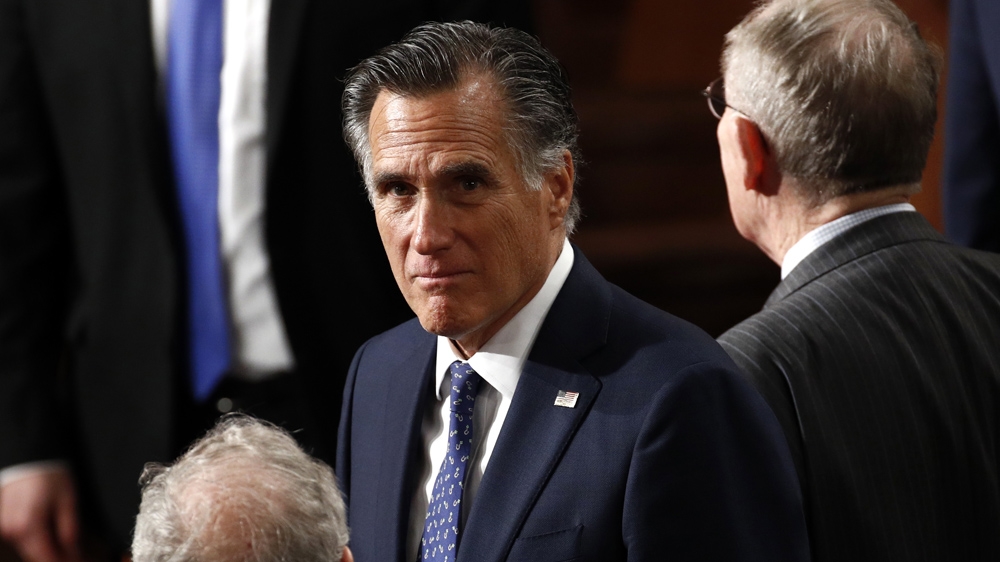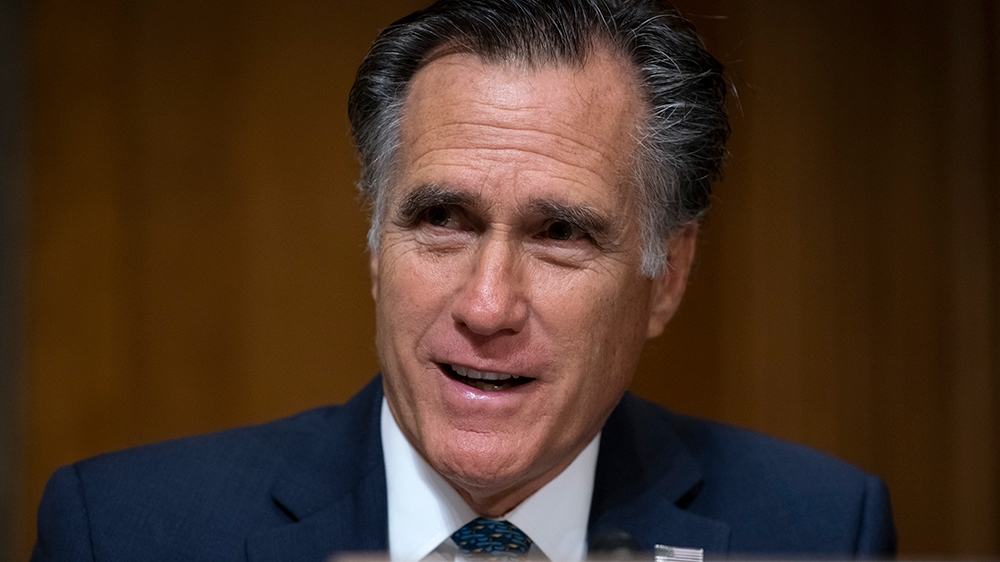The United States impeachment trial of President Donald Trump concluded on Wednesday, on its 13th day, after the Senate voted to acquit Trump of charges of abusing his office and obstructing Congress’ investigation.
A two-thirds vote of senators – 67 out of 100 – was required for conviction. With Republicans holding a 53-47 majority, Trump’s acquittal was certain.
Republican Mitt Romney became the first Senator in history to back the conviction of a president from his own party.
More:
Democratic House managers, who act as prosecutors, had faced an uphill battle from the trial’s start, with hopes of conviction largely hinging on the ability to introduce new evidence, including the possibility of subpoenaing witnesses and documents, into the proceedings. However, even recent revelations in an unpublished book by former National Security Advisor John Bolton proved not enough to tip the scale, with Friday’s 51-49 vote blocking new evidence and sounding a likely death knell for Democrats.
As Trump’s impeachment trial enters its final day, here are all the latest updates as of Wednesday, February 5:
Totally vindicated
Trump’s campaign manager, Brad Pascale said in a statement: “President Trump has been totally vindicated and it’s now time to get back to the business of the American people.”
Leaders to speak
Senate Majority Leader Mitch McConnell is expected to hold a news conference shortly. Senate Democratic leader Chuck Schumer is expected to make a statement after.
US Senate acquits Trump
The US Senate acquitted Trump of both charges in his impeachment trial after the Republican-controlled Senate rallied to protect him ahead of the 2020 presidential election where Trump is running for a second term in office.
The vote brought the historic proceedings to an end.
Final vote, second article
The final Senate vote on the second article of impeachment, obstruction of Congress fell along party lines with 53-47 in favour of acquittal, after Romney voted “not guilty.”
The Senate cleared Trump of accusations that he obstructed Congress’ investigation into whether he acted improperly in withholding US security aid to Ukraine.
Trump acquitted of abuse of power
With a 52-48 final vote, Trump has been acquitted on the first article of impeachment, abuse of power.
The charge stemmed from Trump’s request that Ukraine investigate political rival Joe Biden, a political rival and contender in the November 3 presidential election.
Final vote, first article
The final Senate vote on the first article of impeachment, abuse of power, was 52-48 in favour of acquittal, with every Democrat plus Republican Mitt Romney voting for conviction.
In order to remove a president from office, a two-thirds majority in the Senate is required, so the vote fell short of that.
Romney votes ‘guilty’
Republican Senator Mitt Romney cast his “guilty” verdict on the first article of impeachment, abuse of power – making him the first Senator in history to back the conviction of a president from his own party.
All Democrats will vote to convict
In a statement US Democratic Senator Joe Manchin said he will vote to convict Trump on both articles of impeachment – meaning every Democrat will vote in favour of the president’s removal from office.
Voting whether or not to remove a sitting President has been a truly difficult decision, and after listening to the arguments presented by both sides, I have reached my conclusion reluctantly. My full statement: pic.twitter.com/yIgy6Qf5JZ
— Senator Joe Manchin (@Sen_JoeManchin) February 5, 2020
The road to Wednesday’s vote
The US Senate was poised on Wednesday to acquit Trump on charges of abuse of power and obstruction of Congress. Here is a look at the road to his impeachment and trial.
- Mueller Report – In July 2017, two little-known Democrats in the House of Representatives make the first attempt to impeach Trump, basing it on investigations into Moscow’s interference in the 2016 US elections. They file formal charges known as articles of impeachment, alleging that Trump obstructed justice by firing FBI head James Comey to hinder the Russia investigation by then Special Counsel Robert Mueller. After a two-year probe, Mueller finds insufficient evidence of a criminal conspiracy involving Trump and draws no conclusions on whether Trump obstructed justice.
- Whistle-blower – On August 12, 2019, an anonymous intelligence official files a whistleblower complaint about a phone call between Trump and Ukrainian President Volodymyr Zelenskyy. According to a summary of the call later released by the White House, Trump asked Zelenskyy to investigate both former US Vice President Joe Biden, a Democrat running for president in 2020, and a conspiracy theory that Ukraine, not Russia, was behind 2016 election meddling.
- Impeachment investigation – Amid further reports of Trump’s dealings with Ukraine, House Speaker Nancy Pelosi on September 24 accuses Trump of urging a foreign power to intervene in the 2020 election and announces an impeachment investigation in the Democratic-controlled House. In testimony at televised hearings, US diplomats and officials describe a pressure campaign organised by Trump’s lawyer, Rudy Giuliani, to get Ukraine to announce the Biden investigation. Trump’s freezing of $391m in aid to Ukraine was part of the campaign, according to some testimony.
- Impeachment – On December 18 Trump becomes only the third U.S. president to be impeached when the Democratic-led House approves two articles of impeachment charging him with abuse of power and obstructing Congress.
- The trial – The Senate puts Trump on trial beginning on January 16. The outcome seems in little doubt, as Republicans dominate the chamber where a two-thirds majority is needed to convict and remove the president. While Democrats hoped new witnesses could change the equation, a motion to introduce new evidence was blocked last week.
Democrats praise Romney
Moments after Republican Senator Mitt Romney made the surprise announcement that he would break from party ranks and vote to convict the president on the abuse of power article of impeachment, Democrats took to Twitter in praise of the move.
“Thank you @MittRomney for rising to this moment, for choosing to vote your conscience, and for doing what you know in your heart to be right,” wrote Senator Kirsten Gillibrand.
Thank you @MittRomney for rising to this moment, for choosing to vote your conscience, and for doing what you know in your heart to be right.
— Kirsten Gillibrand (@SenGillibrand) February 5, 2020
“Senator Romney reminds us that it is not impossible to do the right thing, it’s just hard. That putting country over party isn’t just a slogan, it’s our solemn obligation. That individuals who have courage and conviction can change history, and have an obligation to try,” wrote Senator Brian Schatz.
Senator Romney reminds us that it is not impossible to do the right thing, it’s just hard. That putting country over party isn’t just a slogan, it’s our solemn obligation. That individuals who have courage and conviction can change history, and have an obligation to try.
— Brian Schatz (@brianschatz) February 5, 2020
“A powerful and principled statement on the Senate Floor today, @SenatorRomney. An example for all of us. Thank you,” wrote Senator Jeff Merkley.
A powerful and principled statement on the Senate Floor today, @SenatorRomney. An example for all of us. Thank you.
— Senator Jeff Merkley (@SenJeffMerkley) February 5, 2020
Meanwhile, Trump’s son, Donald Trump Jr., in a series of tweets, called for Romney to be expelled from the Republican party.
Look back: How did the House vote on the articles of impeachment?
Speaker of the House Nancy Pelosi announced the impeachment inquiry into President Donald Trump on September 24 of 2018. Nearly two months later, on December 18, the House voted in favour of two articles of impeachment: abuse of power of and obstruction of Congress.
Republican representatives were unified in their opposition, with 195 voting against the abuse of power article along with two Democrats who broke party ranks. Meanwhile, 229 Democrats and one Independent voted in favour of that article.
On the obstruction of Congress article, 195 Republicans again voted against the measure, joined by three Democrats. Meanwhile 228 Democrats and one Independent voted in favour of the second article.
Representative Tulsi Gabbard, a Democrat, voted “present”, refusing to take a side on either article.
Here’s a look back on the day the House impeached Trump.
Romney, in speech on Senate floor, confirms he will break from party and vote to convict Trump
Republican Senator Mitt Romney will vote to convict President Donald Trump on the abuse of power article of impeachment, likely becoming the only Republican senator to favour removing the president from office for his dealing with Ukraine.
“The president is guilty of an appalling abuse of public trust,” said Romney, a 2012 Republican presidential candidate, in a speech on the Senate floor.
“Corrupting an election to keep one’s self in office is perhaps the most abusive and destructive violation of one’s oath of office that I can imagine,” he said.
Republican Mitt Romney to break from party and vote to convict Trump: Report
Republican Senator Mitt Romney – one of only two Republicans to break from the party line and vote for new evidence in the Senate trial – has said he will vote to convict President Donald Trump on the abuse of power article, the New York Times reported.
“I think the case was made,” Romney told the newspaper in an interview in his Senate office on Wednesday morning.
“I believe that attempting to corrupt an election to maintain power is about as egregious an assault on the Constitution as can be made,” Romney said. “And for that reason, it is a high crime and misdemeanor, and I have no choice under the oath that I took but to express that conclusion.”
He said he would not vote to convict the president on the obstruction of Congress article also passed by the House in December.
“I recognise there is going to be enormous consequences for having reached this conclusion,” Romney told the Times, adding the fallout would be “Unimaginable”.
Look back: What happened with the trial’s witness vote?
Democrats had pushed from the beginning of the Senate trial to pass a motion that would permit new evidence to be permitted in the proceedings, which would open the door to subpoena new witnesses and documents.
Democrats proposed an amendment that would allow new evidence on the second day of trial, which was blocked along with 11 others. The rules resolution passed by Republicans put off debate and a vote on evidence until after House managers, who served as prosecutors, and Trump’s defence team presented their cases.
In the following days, attention turned to several Republicans considered possible swing votes on the evidence motion. Four needed to break from the Republican ranks to give Democrats a simple majority. Reports of revelations in a draft book by former National Security Advisor John Bolton, which emerged during the trial, heightened the debate.
In the end, only two Republican Senators, Susan Collins and Mitt Romney, voted in favour of the new evidence. While closely watched Senators Lisa Murkowski and Lamar Alexander stuck with Republicans.
US House Democrats ‘likely’ to subpoena John Bolton: Nadler
Democrats in the US House of Representatives are likely to subpoena Donald Trump‘s former National Security Advisor John Bolton and continue their investigation into the Republican president, the head of the House Judiciary panel said on Wednesday.
House Judiciary Committee Chairman Jerrold Nadler, speaking to CNN, said “I think it’s likely, yes” that their inquiries would continue and that a subpoena for Bolton was also “likely”.
Bolton wrote, according to the New York Times, that Trump had instructed him in May of 2018 to call the president of Ukraine, Volodymyr Zelenskyy, to ensure that he would meet with the president’s personal lawyer, Rudy Giuliani, who was leading the push for the politically motivated investigations. The directive came during a meeting attended by Giuliani, White House acting Chief of Staff Mick Mulvaney, and White House lawyer Pat Cipollone.
Bolton had also recounted an August exchange in which Trump told him to continue to withhold the aid to Ukraine until officials in the country agreed to the desired investigations into the Bidens. The report undercut what had been Trump’s legal team’s main defence – that withholding the aid was unrelated to a push for the investigations.
Kellyanne Conway: Trial vote will mean Trump is ‘acquitted forever’
White House Counselor Kellyanne Conway says the expected vote in the US Senate on the articles of impeachment against US President Donald Trump will mean he is “acquitted forever”.
“I would not be surprised if the opposition to removal of the president is bipartisan. But I think we already know the votes are there…There’s no way there’s no near 67 votes,” Conway said at a news conference on Wednesday.
“There never was. So then I think other people are left to have to explain why they voted the… why they put the country through this, knowing the outcome ahead of time, what was the point?” she said.
Democratic Senator Jones: I will vote to convict Trump
Senator Doug Jones, one of just a handful of closely watched Democrats who face difficult re-election bids, has said he will vote to convict President Donald Trump.
In remarks on the Senate floor, Jones said the sum of the evidence produced “ a picture of a president who has abused the great power of his office for personal gain, a picture of a president who has placed his personal interest well above the interest of the nation”.
The announcement was significant for Democrats, who are hoping their party will present a united front by unanimously voting to remove Trump from office in Wednesday’s final votes. Democratic senators Joe Manchin of West Virginia and Kyrsten Sinema of Arizona are among other Democrats being closely watched for their votes later Wednesday.
What do the articles of impeachment allege?
House investigators allege that Trump abused the power of his office by withholding nearly $400m in congressionally approved military aid and imposing conditions on a White House visit in an attempt to pressure Ukraine into launching investigations on his political rival, Democratic presidential candidate Joe Biden, and his son Hunter Biden.
House investigators further charge that the president obstructed Congress by categorically blocking his administration from providing requested documents and witness testimony.
Read the full text of the articles here.
What did the president’s defence say?
Trump’s defence team portrayed the House inquiry into the president’s dealings with Ukraine as deeply flawed and rushed.
While initially denying there was evidence of “quid pro quo” (Latin for a favour for a favour), the defence shifted their arguments to say that even if there was “quid pro quo”, the president’s actions do not rise to an impeachable offence. The president’s defence team further framed the impeachment as an attempt to undermine US democracy.
“This was the first totally partisan presidential impeachment in our nation’s history. And it should be our last,” the president’s lawyer, Jay Sekulow, said during closing arguments on Monday. “What the House Democrats have done to this nation, to the Constitution, to the office of the president, to the president himself and to this body [the Senate] is outrageous. They have cheapened the awesome power of impeachment.”
What have the House managers said?
The House managers spent their time on the Senate floor outlining the two articles of impeachment against the president: abuse of power and obstruction of justice.
They repeatedly argued the need for new witnesses and documents to be presented in the trial, and portrayed the president as a serial interferer in US elections, who will be further emboldened to meddle in the lead-up to the November elections.
“He has betrayed our national security and he will do so again. He has compromised our elections and he will do so again. You will not change him. You cannot constrain him,” lead House manager Adam Schiff told senators in the impassioned conclusion of closing arguments on Monday. “If you find the courage to stand up to him, to speak the awful truth to his rank falsehood, your place will be among the Davids who took on Goliath – if only you will say, ‘Enough.'”
What happened in the trial?
The trial officially began with a ceremonial start on January 16 that saw the swearing-in of US Supreme Court Chief Justice John Roberts, who is presiding over the proceedings, and the 100 members of the Senate.
The next week began, on January 21, with 12 hours of debate culminating in senators voting along partisan lines to approve Senate Majority Leader Mitch McConnell’s rules resolution. Meanwhile, 11 amendments introduced by Democrats were blocked.
The Democratic House managers then presented their arguments on January 22, 23 and 24.
Trump’s defence presented their arguments on January 25, 27, and 28.
Senators then had two days to submit written questions to both teams, on January 29 and 30, a process that was followed by the vote that blocked allowing more evidence on January 31.
Following that, both sides gave a total of four hours of closing arguments on February 3.
![Chief Justice of the United States John Roberts presides during the US Senate impeachment trial of Trump [US Senate TVReuters] Impeachment](https://www.aljazeera.com/mritems/Images/2020/1/22/283d65f7653e46bb8c7cbeb84e4f262d_18.jpg)







![This artist sketch depicts White House counsel Pat Cipollone speaking in the Senate chamber during the impeachment trial against President Donald Trump [Dana Verkouteren/AP Photo] Trump](https://www.aljazeera.com/mritems/Images/2020/1/29/9c8b4c84db414774bb4f2dac8d6f9ddc_9.jpg)